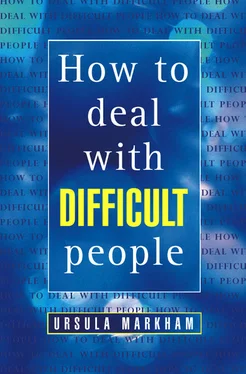Ursula Markham - How to Deal With Difficult People
Здесь есть возможность читать онлайн «Ursula Markham - How to Deal With Difficult People» — ознакомительный отрывок электронной книги совершенно бесплатно, а после прочтения отрывка купить полную версию. В некоторых случаях можно слушать аудио, скачать через торрент в формате fb2 и присутствует краткое содержание. ISBN: , Жанр: unrecognised, на английском языке. Описание произведения, (предисловие) а так же отзывы посетителей доступны на портале библиотеки ЛибКат.
- Название:How to Deal With Difficult People
- Автор:
- Жанр:
- Год:неизвестен
- ISBN:978-0-00-738171-5
- Рейтинг книги:4 / 5. Голосов: 1
-
Избранное:Добавить в избранное
- Отзывы:
-
Ваша оценка:
- 80
- 1
- 2
- 3
- 4
- 5
How to Deal With Difficult People: краткое содержание, описание и аннотация
Предлагаем к чтению аннотацию, описание, краткое содержание или предисловие (зависит от того, что написал сам автор книги «How to Deal With Difficult People»). Если вы не нашли необходимую информацию о книге — напишите в комментариях, мы постараемся отыскать её.
A concise, straightforward book on how to handle difficult people in your personal or professional life.
How to Deal With Difficult People — читать онлайн ознакомительный отрывок
Ниже представлен текст книги, разбитый по страницам. Система сохранения места последней прочитанной страницы, позволяет с удобством читать онлайн бесплатно книгу «How to Deal With Difficult People», без необходимости каждый раз заново искать на чём Вы остановились. Поставьте закладку, и сможете в любой момент перейти на страницу, на которой закончили чтение.
Интервал:
Закладка:
Begin by tackling small problems rather than major ones. Then you will be able to register a number of successes fairly quickly instead of feeling that you are putting in a great deal of effort and achieving little. Do remember, however, to stop and give yourself credit for whatever successes you achieve, however minor. One of the attributes of the assertive person is that he is able to feel pleased with his progress.
Think of a situation where you feel that you have not acted assertively. This can be connected either with your working or home life, as developing assertiveness applies across the board. Ask yourself these questions
What is the situation?
Is the other person concerned aggressive, submissive or assertive?
What has been my reaction to date?
What would an assertive reaction be?
Even if you are not yet certain that you would be able to put this assertive behaviour plan into action (although, once you have read further, you should know just what to do), at least you will have worked out the situation, understood where any manipulation is coming from and seen the effect of reaction and counter-reaction between the people concerned.
Whatever type of person you encounter, as an assertive person you should be able to do all of the following:
Express your positive feelings: ‘I do like your new hairstyle;’ ‘I love you.’
Express your negative feelings: ‘I don’t like it when you speak like that;’ ‘I’m frightened.’
Say no: ‘No, I can’t work through my lunch break;’ ‘No, I don’t like Mexican food.’
Give an honest opinion: ‘I think we should leave now;’ ‘I don’t agree.’
Say that you are angry, provided that anger is justified: ‘The way you do that irritates me;’ ‘I feel angry when you are rude to others.’ (Note that saying that you are angry does not have to involve raising your voice, becoming abusive or thumping the furniture. Acknowledging the emotion and expressing it is quite sufficient for others to know where they stand).
As an assertive person you have certain rights:
You are entitled to ask for what you want – but you also have to remember that the other person is entitled to say no.
You are entitled to make decisions and choices for yourself.
Because you are a human being and therefore fallible, sometimes these decisions and choices will turn out to be the wrong ones – but, as an assertive person you will be prepared to face the consequences whether they are good or bad.
You are entitled to your own opinions and feelings, to acknowledge them to yourself and to express them to other people.
You are entitled to make mistakes, bearing in mind that others must be allowed to make mistakes, too.
You are entitled not to know everything.
This does not mean that you are ignorant, foolish or a failure.
You are entitled to decide whether you want to become involved in someone else’s problems.
As an assertive person, however close you may be to another person and however much he may try to persuade you to intervene, only you can decide whether to do so or not.
You are entitled to change your mind.
If your change of mind involves other people, you will do them the courtesy of informing them rather than leaving them to find out at some later date.
You are entitled to privacy.Everyone needs a certain amount of time and space alone, whatever his circumstances. Unfortunately it is often taken as a sign that you are unhappy with those around you. As an assertive person you will offer reassurance and explain that no such inference is intended. Of course, you will also remember that those around you are entitled to some privacy, too, and will not take offence if they express a desire to be alone at times.
You are entitled to achieve.If you have ideas, a positive attitude and energy, by all means combine them and achieve all you can. Provided you have not taken unfair advantage of others you should feel proud of what you have done.
You are entitled to alter yourself in any way you choose – granting the same right to other people.
Think back over your recent past and see if you can remember a way in which you have abused your own rights. Perhaps you can say ‘I never have a moment to myself or ‘I get drawn into other people’s quarrels.’ Be aware of your reactions to others, remember your rights and decide how you will do things differently in the future.
Becoming assertive is more than just a way of dealing with difficult people or of coping with awkward situations. It is a means of making personal progress. Whether you think that this life is all that counts or whether you believe that what we do is part of a longer and deeper evolution, personal development is essential if you are to achieve in any real sense. It is up to you to decide what you want – from a particular situation or from life in general – and then set goals and work towards them. Don’t worry if success seems a little elusive at times; even slow progress is positive progress.
A non-assertive person lets life happen to him. He sits back and waits to see what occurs. An assertive person decides what he wants and sets out on the path to it. He will take some chances and make some mistakes. He will learn from his errors, picking himself up and trying again. While it may be true that if you never join in a game (i.e. take chances) you never lose – you never win, either.
Giving and Receiving Compliments
A genuine compliment, gladly given, can give the recipient so much pleasure that it is a real pity most people find it such a difficult thing to do. Get into the habit of giving compliments – don’t save them for special occasions. Whether you are informing a business colleague that you think he has performed a task particularly well or telling your daughter you love the painting she has brought home from school, you will be bringing happiness and a sense of achievement into the other person’s life. The positive energy derived from a sense of achievement can spur a person on to even greater things in the future.
Thinking back to the first chapter and the way so many people have been programmed to think of themselves of failures, by helping others to consider themselves achievers you may be breaking a negative mould which has been impeding their personal progress for years. And all for the sake of a sincere compliment.
It is important, of course, that the compliments you give should be sincere. The recipient will soon see through false praise and will either doubt your honesty (and therefore lose trust in you) or think that you have some ulterior motive.
If you are going to give compliments to other people, you also have to learn how to accept them yourself. Many people tend to think of themselves as ‘unworthy’ or to put themselves down. How many times have you heard someone respond to a compliment with some self-deprecating comment?
‘Your hair looks particularly nice today.’
‘Oh, no, it looks awful really.’
All that is needed is a simple ‘thank you’ and a smile; then both ‘complimentor’ and ‘complimentee’ will feel satisfied.
Making Changes
These can be changes in your appearance, behaviour, routine, goals – or in your ideas. Circumstances, other people’s opinions and sometimes the media have all contributed to our preconceived ideas about those around us. Every young man clad in black leather and big boots is not a potential thug any more than every little old lady with silver hair is sweet-natured, but years of pigeonholing may lead us to group people together based on their outward appearance.
If you are to be assertive, you need to make a commitment to change some part of yourself or your life. You might decide to change your style of clothes, to learn about a subject at evening classes or to alter your behaviour in particular situations. Start now by choosing some aspect of your life which you intend to change. Reinforce your commitment by writing down the details of your projected change:
Читать дальшеИнтервал:
Закладка:
Похожие книги на «How to Deal With Difficult People»
Представляем Вашему вниманию похожие книги на «How to Deal With Difficult People» списком для выбора. Мы отобрали схожую по названию и смыслу литературу в надежде предоставить читателям больше вариантов отыскать новые, интересные, ещё непрочитанные произведения.
Обсуждение, отзывы о книге «How to Deal With Difficult People» и просто собственные мнения читателей. Оставьте ваши комментарии, напишите, что Вы думаете о произведении, его смысле или главных героях. Укажите что конкретно понравилось, а что нет, и почему Вы так считаете.












